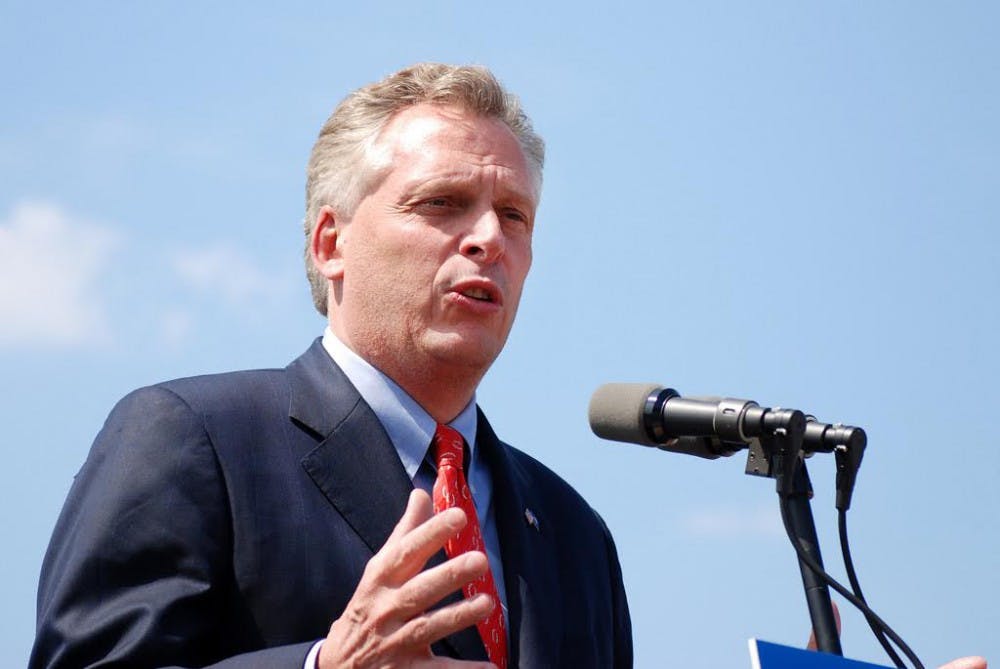Virginia Gov. Terry McAuliffe signed legislation designed to protect free speech on college campuses into law on March 16.
“Except as otherwise permitted by the First Amendment to the United States Constitution, no public institution of higher education shall abridge the constitutional freedom of any individual, including enrolled students, faculty and other employees and invited guests, to speak on campus,” the text of HB 1401 reads.
Del. Steven Landes (R-Weyers Cave), the bill’s chief patron, said he hopes the bill will encourage a diversity of opinion and discussion at Virginia colleges.
“The goal is to try to promote free dialogue and expression of thoughts and ideas on college campuses,” Landes said in an interview Wednesday. “That’s the way it was when I was a college student and we just want to make sure that’s the case now and in the future so that students, faculty, staff and individuals who come on campus can have that open debate and dialogue.”
The bill received bipartisan support in both the House of Delegates and Senate before reaching McAuliffe. The bill originally passed through the House of Delegates with a 76-19 vote.
In the Senate, the bill passed with a 36-4 vote after a short amendment was proposed to add the term “constitutional” in describing the freedoms the bill protects. After returning to the House, the bill passed with 79 yea votes.
“I hope it’s going to protect not only people who are invited to speak, but also the student’s rights to express themselves in a peaceful manner and to not be afraid of being punished for saying something,” Del. Jennifer Boysko (D-Herndon) said. “Having a group of diverse points of view helps people grow and understand one another better.”
The bill comes at a time where some critics have suggested forms of free speech are under threat at universities and campuses around the country.
“There is a general attitude right now on college campuses that politically conservative voices are being discriminated against,” Josh Wheeler, director of the Thomas Jefferson Center for the Protection of Free Expression, told The Cavalier Daily in a previous interview. “This bill is a reaction to that.”
Rioting at the University of California-Berkeley in February led to the cancellation of a speech by conservative and the former Breitbart News editor Milo Yiannopoulos.
Earlier this month, protesters at Middlebury College interrupted a speech by controversial author Charles Murray — who is accused of holding racist beliefs. The protests turned violent when a faculty member suffered injuries.
When the bill was proceeding through the General Assembly, Landes said the legislation was intended to prevent the cancellation of invited guest speakers on campuses.
“Hopefully, it will encourage freedom of speech and the exchange of diverse ideas without fear of reprisals,” Del. Mark Cole (R-Spotsylvania), one of the co-patrons of the bill, said in an email to The Cavalier Daily Wednesday.
University President Teresa Sullivan gave a speech earlier this month stressing the importance of free speech as a vehicle for dialogue and debate.
“If we protect college students today from opposing views and diverse perspectives through ‘speech codes’ or other restrictions on free expression, we do them a great disservice, because we’re leaving them unprepared for the intellectual and social fray that they will enter the moment they step off our campuses,” Sullivan said in the keynote address at 99th annual American Council on Education conference on March 12.
While there have not been any recent high-profile incidents of alleged censorship at Virginia universities and colleges, Landes said he thinks the bill ensures proper legal protections if any issues arise.
“If what we see happen in other states starts occurring on Virginia campuses, faculty, students, staff [and] invited speakers would have something to hang their hat on from the standpoint of their protection of free speech,” Landes said. “Just to supplement what has already been in the code and what the first amendment protects.”
Opponents of the bill, however, suggested it could potentially open the door to more hate speech on college campuses.
“People were saying hateful remarks or doing improper things, I don’t want to encourage that and this bill in some ways could encourage that," Del. John Bell (D-Loudoun) previously said to The Cavalier Daily.
Some critics of the bill also labeled it as redundant, given that the First Amendment of the Bill of Rights provides constitutional protections for free speech.
Several instances of hate speech have occurred at the University over the last year, including a man yelling racial slurs in Clemons Library, anti-Semitic graffiti outside of the GrandMarc apartment complex, bigoted chalking across Grounds, racial slurs written in first-year dorms and an anti-Muslim comment written outside of a student’s room .
Landes said he does not believe that the bill will do anything to encourage or embolden hate speech.
“In the case of guest speakers this statute only protects their free speech if they’re invited to campus and they’re speaking,” Landes said. “You can still limit anyone who tries to incite violence or those other things that the Supreme Court has said someone can't do under the auspices of saying it’s their freedom of speech.”
Boysko said she thinks the bill would actually provide further protection for people challenging hate speech.
“I see this more as a way to protect people speaking out against hate speech,” Boysko said. “The students have that right to say ‘this is not what we stand for,’ and I want them to know that they will not be punished for peacefully using their voices.”
McAuliffe’s office did not respond to requests for comment on Wednesday.
The new law is set to take effect on July 1.







